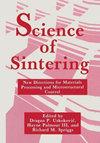Influence of sintering temperature on structure, physical, and optical properties of wollastonite based glass-ceramic derived from waste eggshells and waste soda-lime-silica glasses
IF 1.4
4区 材料科学
Q3 MATERIALS SCIENCE, CERAMICS
引用次数: 0
Abstract
Calcium oxide from discarded eggshells and waste soda-lime-silica were utilized in this study to make wollastonite (CaSiO3) based glass-ceramics. The calcium oxide and silica were made using the melt-quenching process and sintered for 2 hours at 700 to 1000?C. The XRD data verified that the wollastonite crystalline peak appeared at high sintering temperatures, with crystalline phase values of 39.74%, 47.37%, and 48.91% as the sintering temperature increased at 800-1000?C, respectively. Additionally, crystalline size and phase have no obvious change at 800-1000?C, where the intensity has increased by the sintering temperature. The FTIR spectra revealed the wollastonite phase vibration at the wavelength of 501 cm-1, 650cm-1, 715cm-1, 808cm-1, 931cm-1, 2129 cm-1. Additionally, the FTIR spectral confirm the Si-O-Ca vibration band at the wavelength of 650 cm-1. For the optical sample, the value of indirect allowed transition with n=2 is the ideal value of the optical band gap based on a band gap rise from 3.89 to 4.23 eV with increasing sintering temperature. The value n=2 which is the indirect allowed transition is the optimal value of the optical band gap based on the value increase from 3.89-4.23 eV as the temperature increase. The synthesis approach introduced the low-cost method, recycle approach, simple and yet uses cheap starting materials for fabrication of wollastonite glass-ceramics product.烧结温度对废蛋壳和废钠石灰硅玻璃制备硅灰石基微晶玻璃结构、物理和光学性能的影响
本研究利用废弃蛋壳中的氧化钙和废钠石灰二氧化硅制备硅灰石(CaSiO3)基微晶玻璃。采用熔体淬火法制备氧化钙和二氧化硅,在700 ~ 1000℃下烧结2小时。XRD数据验证了硅灰石在烧结温度较高时出现结晶峰,在800 ~ 1000℃时,随着烧结温度的升高,硅灰石的晶相值分别为39.74%、47.37%和48.91%。C,分别。在800 ~ 1000℃时,晶粒尺寸和相无明显变化。C,其中强度随烧结温度的增加而增加。FTIR光谱显示硅灰石在501 cm-1、650cm-1、715cm-1、808cm-1、931cm-1、2129 cm-1波长处存在相振动。另外,FTIR光谱在650 cm-1波长处确认了Si-O-Ca的振动带。对于光学样品,随着烧结温度的升高,带隙从3.89 eV上升到4.23 eV, n=2时的间接允许跃迁值是光学带隙的理想值。随着温度的升高,从3.89 ~ 4.23 eV的范围来看,间接允许跃迁值n=2是光学带隙的最优值。该合成方法采用低成本法、循环法、简单而又使用廉价原料制备硅灰石微晶玻璃制品。
本文章由计算机程序翻译,如有差异,请以英文原文为准。
求助全文
约1分钟内获得全文
求助全文
来源期刊

Science of Sintering
工程技术-材料科学:硅酸盐
CiteScore
2.50
自引率
46.70%
发文量
20
审稿时长
3.3 months
期刊介绍:
Science of Sintering is a unique journal in the field of science and technology of sintering.
Science of Sintering publishes papers on all aspects of theoretical and experimental studies, which can contribute to the better understanding of the behavior of powders and similar materials during consolidation processes. Emphasis is laid on those aspects of the science of materials that are concerned with the thermodynamics, kinetics and mechanism of sintering and related processes. In accordance with the significance of disperse materials for the sintering technology, papers dealing with the question of ultradisperse powders, tribochemical activation and catalysis are also published.
Science of Sintering journal is published four times a year.
Types of contribution: Original research papers, Review articles, Letters to Editor, Book reviews.
 求助内容:
求助内容: 应助结果提醒方式:
应助结果提醒方式:


